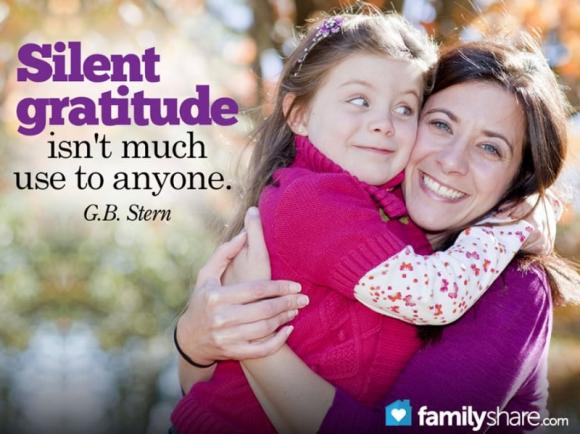
I remember a proud moment in my short parenting life very vividly. I had a beautiful little 3-year-old girl. She was full of fire, and we tried to temper her attitude by teaching her to say thank you when she received something. We hoped this would urge her to look outside herself. I know, tall order for a 3-year-old.
My moment happened when a very elderly gentlemen opened a door for us, we walked by and I said thank you. After we had passed the gentlemen Haley let go of my hand and ran back to him, hugging his knee and said "Tank you!" The gentlemen was so startled he laughed and looked her in the eye saying, "That means so much to me, it's been a long time since a child has said thank you to me." That gave me pause.
Gratitude is becoming a lost art with today's youth. It is direct opposition to the entitlement that is becoming the norm. So what is so important about thanks? And how can we teach our children to be grateful?
Take a moment to think about a time when you were thanked for something you did, or gave. How did you feel when you heard the words, "Thank you?" They are two magical words. It can bring warmth and happiness into anyone's soul.
Here are some tips for teaching your children the value of gratitude.
Say a prayer of gratitude
The intense warmth and love you feel expressing your gratitude to God will change the way you look at your life.
Gratitude, when truly embraced, eliminates jealousy, envy, and ingratitude. This is a value we want our children to have. It empowers them to focus on all the positive in their lives. It teaches them to have a positive attitude about all the things God and you do for them.
Create an opportunity to serve someone
If you have an elderly neighbor, help your children rake her leaves, or make a treat for her. Let your children deliver the treat, or do the service with your support. Choose someone who you know will be grateful and show your children gratitude by thanking them. Remind your children that they won't always be thanked by people, but God will always appreciate their service.
Say thank you
If your child receives a gift, from anyone, have him write a thank you note. Putting gratitude on paper, and reflecting on what he wants to say can help him feel gratitude for the gift - and not just happiness he received it. This is great after Christmas. Spending a day creating thank you cards and walking them to the post office can be great fun.
Have a gratitude wall
We have a wall in our home that a few times a year we turn into a glorious mess of handwritten notes, thanking members of our family for everything. It doesn't have to be a huge service, my 5-year-old thanked his big brother for playing Legos with him. It has become a wonderful tradition in our home. It helps our children look for ways to thank others. If you don't want a wall, encourage your family to write little notes for others to find on their pillow at night or on their plate at dinner.
Begin a family blessing journal
. Each night write down all the ways your family has been blessed in a family journal. As you tuck your children into bed, let them list ways they were blessed at school, by teachers or by friends. You will be surprised at how fast your blessing journal fills up. It will also help you recognize the miracles in your life.
Reward gratitude
To get started choose to praise your child each time they express thanks or gratitude. Be grateful when they are grateful. Keep a chart and mark it each time you hear a magic word like thank you. When the chart is full, reward your family with a treat or fun activity.
Whichever way you choose to encourage your family to be grateful for what they have, you will never regret their learning this value. Gratitude can change the way your children see the world. It lets them know they are enough and it empowers them with the wish to serve others. Gratitude is an outward expression of love - and everyone could use more of that. Take a moment this month to teach your family the power of gratitude.

